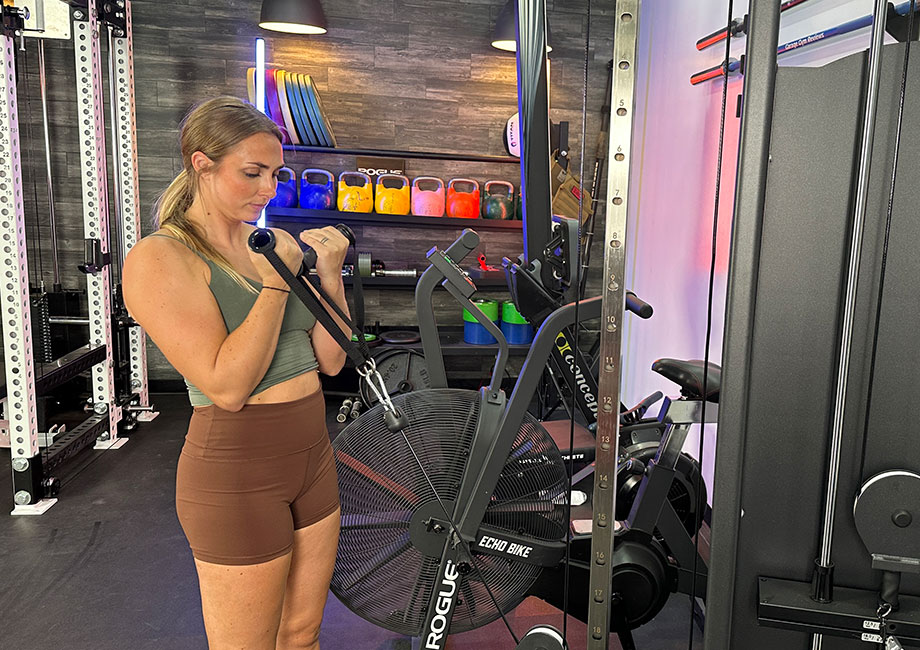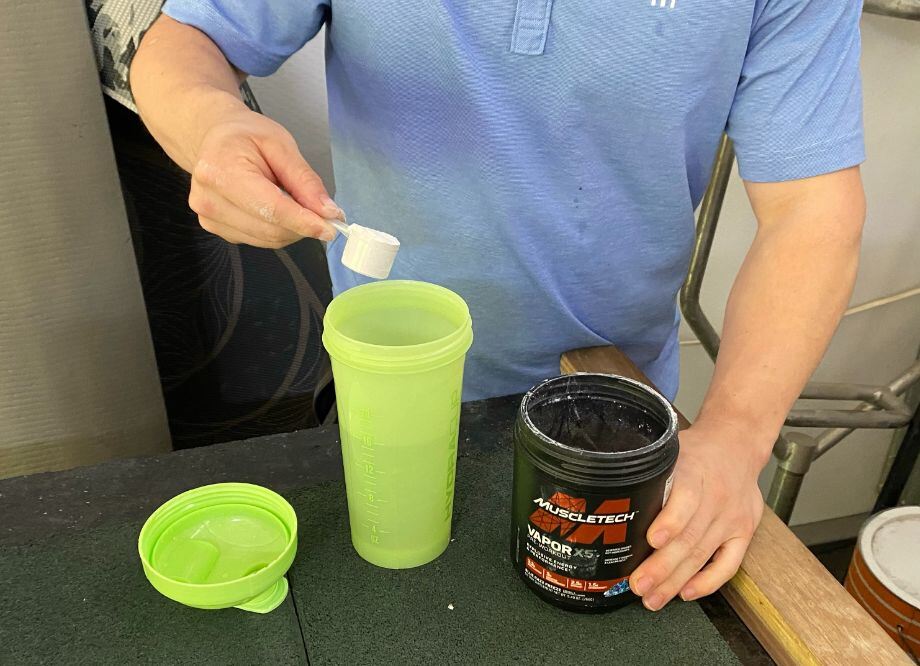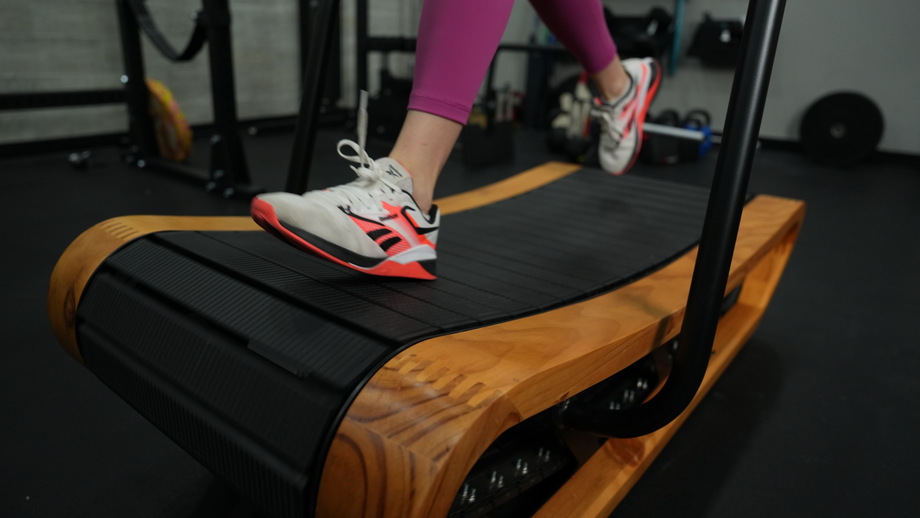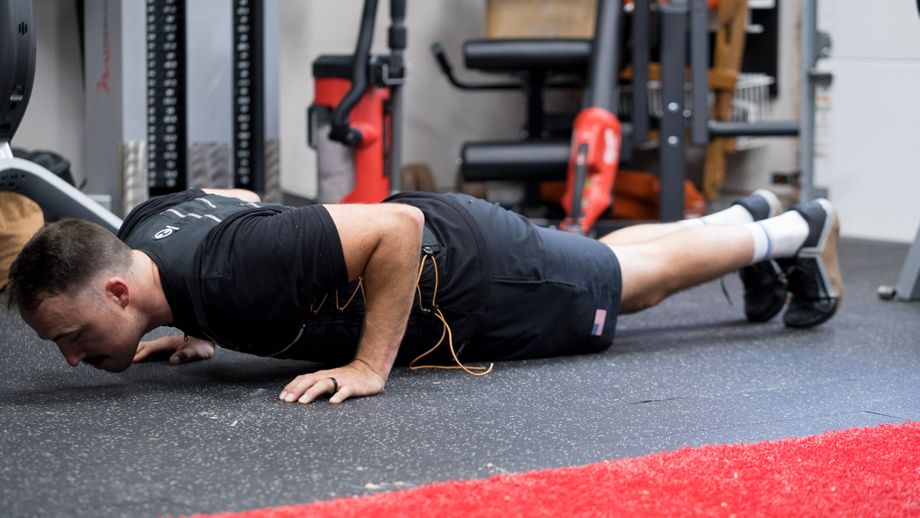Some fitness enthusiasts criticize direct bicep training, feeling it’s inferior to isolate the bicep when training larger muscle groups will contribute to better all-around fitness. They’re just mad they don’t have big, bulging biceps that would make even Arnold blush, am I right?
Joking aside, many gymgoers, especially bodybuilders, enjoy isolating the biceps to build bigger, stronger arms. It’s common to see them at the gym blasting out bicep curls with a barbell or dumbbell, but are they overlooking one of the biggest bicep builders out there?
The fact of the matter is the cable machine doesn’t always get its due when putting together an effective bicep-building regimen. In fact, a 2014 study performed by the American Council of Exercise1 actually determined the cable curl ties for second place with the chin-up, providing equal biceps brachii activation, losing to only the concentration curl which reigns supreme.
We’re here to share a great collection of arm exercises and a cable biceps workout that will PUMP…YOU UP!
Who’s looking for two tickets to the gun show? Let’s get it.
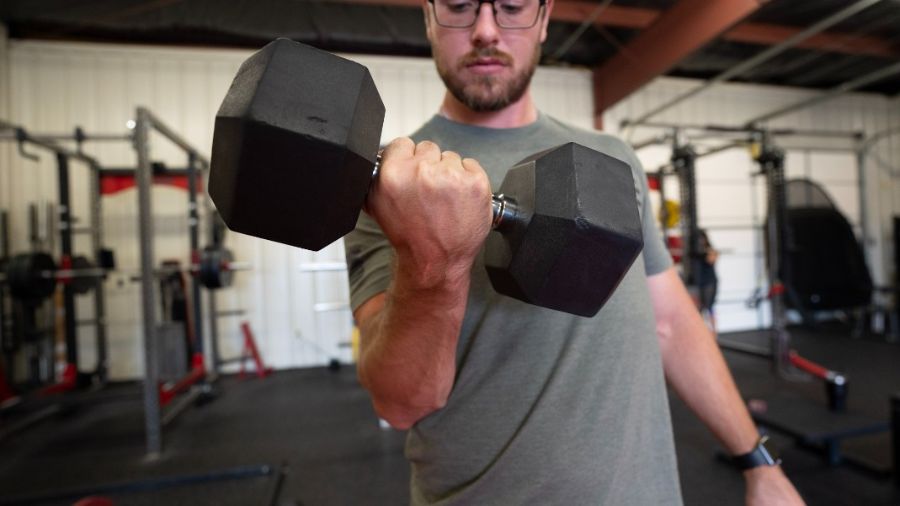
Biceps Anatomy
Before you get your pump on, let’s pump the brakes and talk about biceps anatomy2 a little first.
The biceps muscle, or biceps brachii, is a two-headed muscle that originates at the scapula and attaches to the upper arm bone by the means of two tendons, the short head and the long head. Biceps are responsible for flexing the elbow and supinating the forearm, or turning your palm upward in layman’s terms.
Your bicep muscles also play a role in stabilizing the shoulder joint, predominantly during overhead movements, and in assisting shoulder flexion and rotation.
Beyond the biceps brachii, the biceps area consists of various muscle groups including the brachialis muscle, located under the biceps brachii, and the brachioradialis muscle, located on the outer part of the upper arm.
Your body recruits the bicep in a variety of upper body exercises, including pull-ups, chin-ups, rows, and curls. The biceps muscle is also important in everyday activities such as lifting and carrying objects, and it also helps to improve your posture.
RELATED: Isolation Exercises 101: More Than 30 Isolation Movements And Why You Should Do Them
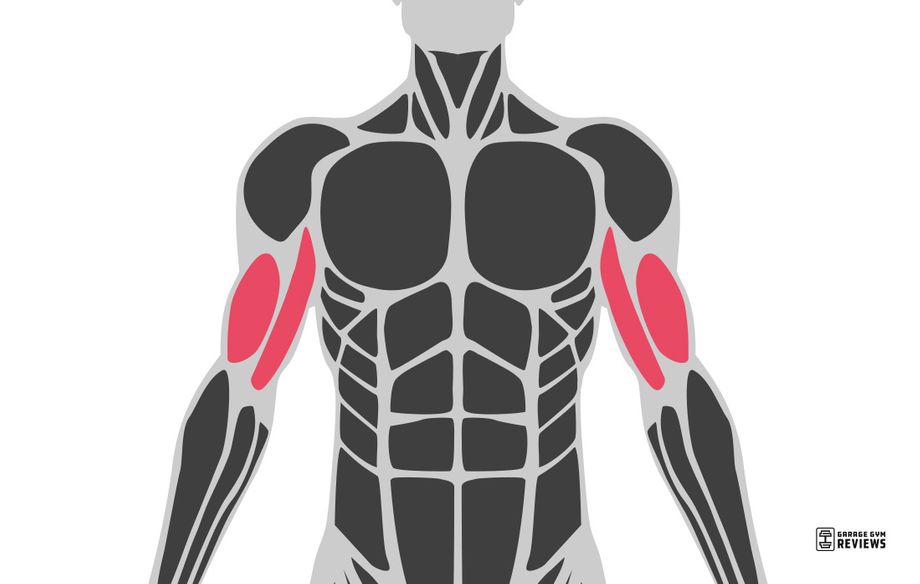
How to Properly Target and Isolate the Biceps
A lot of movements hit the biceps to some degree. For example, pull-ups, chin-ups, rows, and deadlifts all provide some activation. Because of the biceps’ anatomy, many exercises that involve a supinated, or underhand, grip will recruit the biceps to some degree.
But how do we hit just the bicep and really work that bad boy? How do we properly target and isolate the biceps to really inspire hypertrophy?
Put simply–it’s the almighty curl.
There’s a reason most bodybuilders working to sculpt their biceps turn to the humble curl to focus on that one specific region of the arm. Stabilizing the elbow during the curl, using either an incline bench for concentration curls or a preacher bench for the preacher curl, provides further isolation of the biceps muscles.
Luckily, there is a wide variety of curl variations to work into your regimen, keeping things interesting while building your biceps.
Benefits of Cables vs Free Weights for Biceps
Cables and free weights are both effective when targeting the biceps, but each comes with their own unique set of benefits.
Free weights, including barbells, dumbbells, and kettlebells, allow a greater range of motion. Since you’ll need to recruit stabilizing muscles to hold the weight steady, you’ll use a more natural and functional movement pattern that often translates well into everyday activities3 when using free weights. They are more accessible and easier to add into home gyms as well, as a cable machine is an expensive, bulky, big ticket item that often takes up lots of floor space.
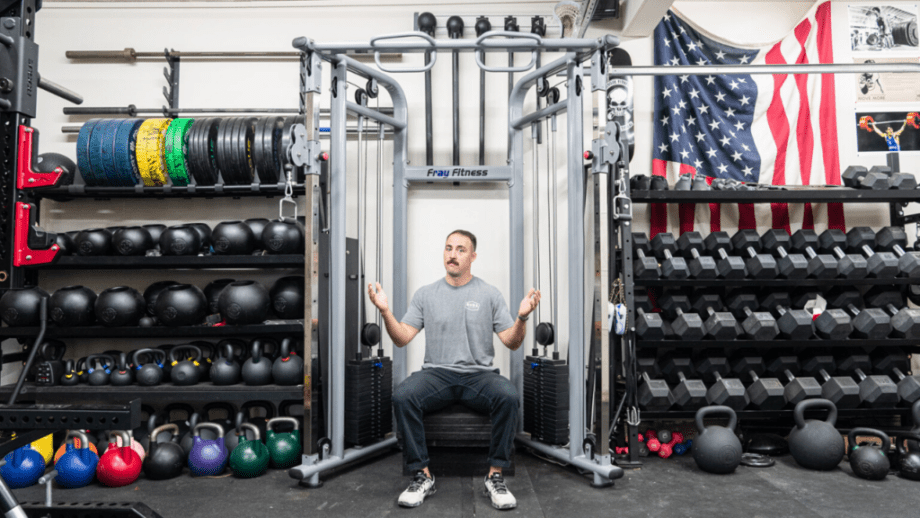
Cables, on the other hand, provide dynamic resistance which provides constant tension on the muscle throughout the range of motion. In fact, a 2010 study published in the Journal of Strength and Conditioning Research4 observed subjects were capable of fewer bicep curls when using a cable machine, presumably because the “more uniformly distributed external resistance” created “greater average muscle tension…throughout the range of movement.”
Based on these observations, researchers concluded that cable machines could “enhance the benefits of the resistance exercise, especially for those seeking greater increases in muscular hypertrophy.”
Free weights tend to be more popular for powerlifters, bodybuilders, and functional athletes, but cable machines are excellent at encouraging all-around good health and fitness as well. Beginners often find cable machines less intimidating and easier to operate as well. For general fitness purposes, it’s good to incorporate both free weights and cable exercises into your workout routine.
What might that routine with cable exercises look like?
Here are some to get you started!
1. Basic Cable Biceps Curl (Straight Bar Attachment)
Why it’s great: The basic cable biceps curl is one of the best exercises for isolating your biceps. Similar to good old dumbbell curls, it involves grabbing a straight bar attachment and curling it to your chest for the desired number of repetitions.
How to do it:
- Adjust the cable machine to the desired weight, attach the straight bar attachment to the cable, and set it to the low pulley position.
- Stand facing the machine with your feet shoulder-width apart and knees slightly bent.
- Grab the straight bar using an underhand grip with your hands shoulder-width apart.
- Keep your elbows pinned to your sides and engage your core.
- Slowly curl the bar towards your shoulders. Squeeze your biceps at the apex of the movement.
- Slowly lower the bar to the starting position using control throughout the movement and keeping your elbows pinned to your sides.
- Repeat as needed.
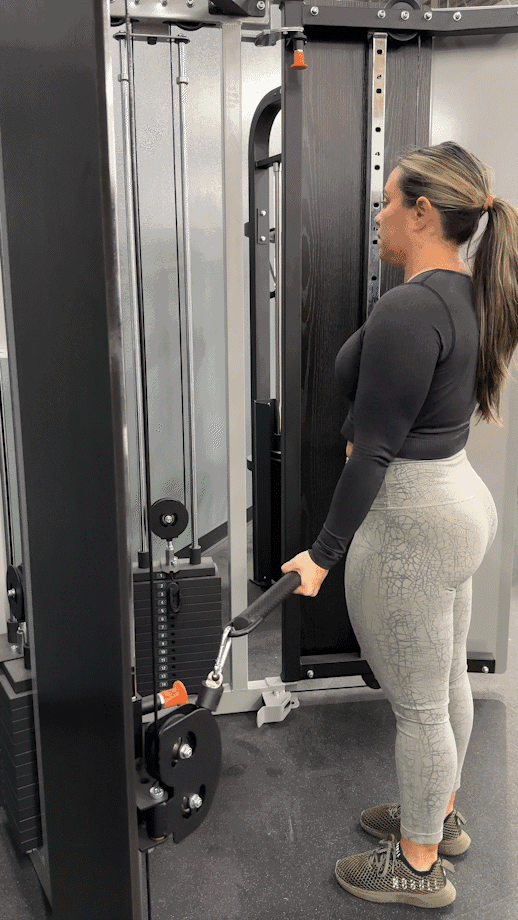
2. Cable Biceps Curl (Rope Attachment)
Why it’s great: One simple alteration of adding a cable rope attachment totally changes the game. You get a more targeted approach to the bicep muscle, a unique hand positioning, greater range of motion, and a more intense contraction of the biceps muscles.
How to do it:
- Adjust the cable machine to the desired weight, attach the straight bar attachment to the cable, and set it to the low pulley position.
- Stand facing the machine with your feet shoulder-width apart and knees slightly bent.
- Grab the straight bar using an underhand grip with your hands shoulder-width apart.
- Keep your elbows pinned to your sides and engage your core.
- Slowly curl the rope towards your shoulders. Squeeze your biceps at the apex of the movement.
- Slowly lower the rope to the starting position using control throughout the movement and keeping your elbows pinned to your sides.
- Repeat as needed.
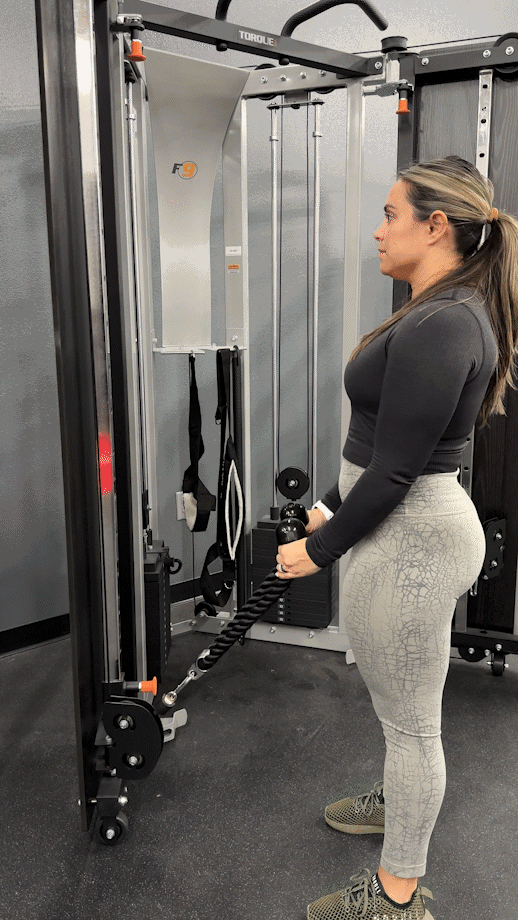
3. Cable Preacher Curl
Why it’s great: Similar to its free weight version, the cable preacher curl targets the bicep big time by keeping your upper arm in a fixed position and limiting the use of other muscle groups.
How to do it:
- Adjust the cable machine to the desired weight, attach the straight bar attachment to the cable, and set it to the low pulley position. You may substitute the straight bar attachment for the EZ bar attachment if you have one.
- Sit on the preacher bench with your back against the pad and your arms extended out in front of you, holding the bar attachment with an underhand grip.
- Keep your elbows pinned to the bench while engaging your core.
- Slowly curl the bar towards your shoulders. Squeeze your biceps at the apex of the movement.
- Slowly lower the bar to the starting position using control throughout the movement and keeping your elbows pinned to your sides.
- Repeat as needed.
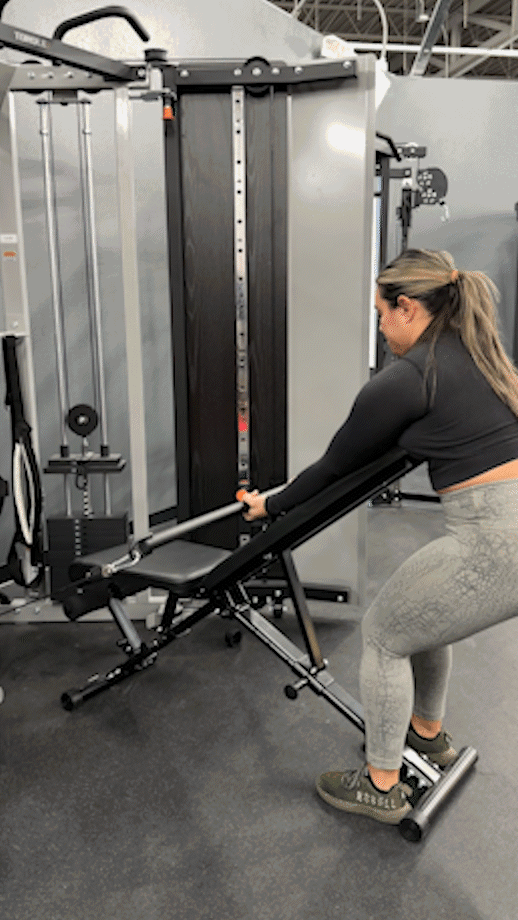
4. Cable Reverse Curls
Why it’s great: While your regular run-of-the-mill curl variations hit the biceps brachii reliably, the reverse cable curl will help isolate the underrated yet important brachioradialis and brachialis muscles, and your wrist flexors, too!
How to do it:
- Adjust the cable machine to the desired weight, attach the straight bar attachment to the cable, and set it to the low pulley position.
- Stand facing the machine with your feet shoulder-width apart and knees slightly bent.
- Grab the straight bar using an overhand grip with your hands shoulder-width apart.
- Keep your elbows pinned to your sides and engage your core.
- Slowly curl the bar towards your shoulders. Squeeze your biceps at the apex of the movement.
- Slowly lower the bar to the starting position using control throughout the movement and keeping your elbows pinned to your sides.
- Repeat as needed.
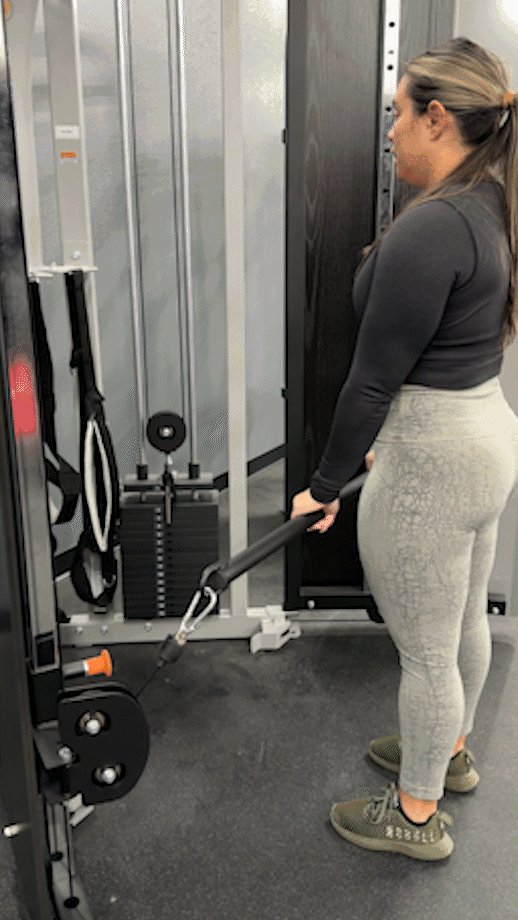
5. Cable Hammer Curl (D-Handle Attachment)
Why it’s great: The neutral grip employed during a hammer curl helps engage all areas of the bicep, including the bicep brachii, brachioradialis, and brachialis muscle. It’s one of the best for muscle growth, strength increases, mass building, and improving grip strength too!
How to do it:
- Adjust the cable machine to the desired weight, attach the D-handle attachment to the cable, and set it to the low pulley position.
- Stand facing the machine with your feet shoulder-width apart and knees slightly bent.
- Grab the D-handle attachment with a neutral grip and your hands shoulder-width apart.
- Keep your elbows pinned to your sides and engage your core.
- Slowly curl the bar towards your shoulders. Squeeze your biceps at the apex of the movement.
- Slowly lower the bar to the starting position using control throughout the movement and keeping your elbows pinned to your sides.
- Repeat as needed.
6. Single-Arm Cable Curls
Why it’s great: Performing your standard cable curl unilaterally helps encourage muscle symmetry and correct muscle imbalances. It’s great both for the bodybuilder trying to sculpt their biceps with precision as well as the recovering athlete working to restore strength to a recently injured arm during physical therapy.
How to do it:
- Adjust the cable machine to the desired weight, attach the single-grip handle attachment to the cable, and set it to the low pulley position.
- Stand facing the machine with your feet shoulder-width apart and knees slightly bent.
- Grab the single-grip handle using an underhand grip with your hands shoulder-width apart.
- Keep your elbows pinned to your sides and engage your core.
- Slowly curl the bar towards your shoulders. Squeeze your biceps at the apex of the movement.
- Slowly lower the bar to the starting position using control throughout the movement and keeping your elbows pinned to your sides.
- Repeat for the desired number of reps, then switch sides and repeat all steps.
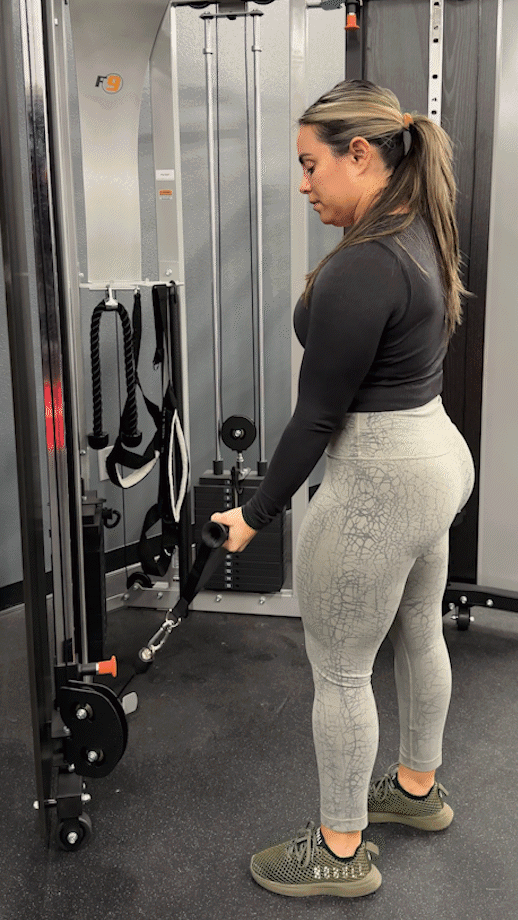
Putting It All Together: Ultimate Cable Biceps Workout
It’s great that we’ve discussed all the “ingredients” of a great cable biceps workout, but they’re nothing without a “recipe” for success now, aren’t they?
There are many ways to structure a workout program that includes these exercises, but it will look a little different depending on your personal goals. A 2021 study published in Sports (Basel)5 concluded:
- A low repetition scheme with heavy loads (from 1 to 5 repetitions per set with 80% to 100% of 1-repetition maximum (1RM)) optimizes strength increases.
- A moderate repetition scheme with moderate loads (from 8 to 12 repetitions per set with 60% to 80% of 1RM) optimizes hypertrophic gains.
- A high repetition scheme with light loads (15+ repetitions per set with loads below 60% of 1RM) optimizes local muscular endurance improvements.
Put simply: Do 1 to 5 heavy reps for strength gains, 8 to 12 reps at a moderate weight for hypertrophy, and high reps at light weights to encourage endurance.
The number of sets you complete will depend on your goals and current fitness level as well. Generally speaking, three to five sets using the above rep schemes will help you achieve your goals, but this may vary depending on the total number of exercises you choose to include during your session. Five sets of each exercise above might be overkill, while five sets of only two might not be enough.
When in doubt, consult a qualified coach or personal trainer to create a personalized plan for your fitness level and goals.
RELATED: How Many Reps To Build Muscle: Advice From A Certified Personal Trainer
Final Thoughts: Cable Biceps Workout
The cable machine, with its seemingly endless array of handle attachments, always provides new and exciting ways to achieve our fitness goals, and getting a great bicep workout is no exception to that.
Still not sold on how cable machines could help contribute to bigger, badder biceps?
Don’t take our word for it; hit the gym and get to work. Put our exercises to the test and see what they can do firsthand.
Just make sure you throw us a nod when you’re getting hearts and fire emojis on your swole gym selfie pics. Deal?
Q&A: Cable Biceps Workout
Can you build biceps with cables?
Traditionalists might feel there’s no way a cable machine could provide the same kind of arm workout dumbbells can, but that’s just not true. Next to the concentration curl, the cable curl is the best exercise for bicep building.
Are straight bars better than EZ bars for biceps?
The undulated bar, or EZ bar, is a popular alternative to the straight bar. A 2018 study published in Peer J6 compared EZ bar curls, straight bar curls, and dumbbell curls.
The study concluded there were only subtle differences between a straight bar and EZ bar curl, but “the EZ variant may be preferred over the [dumbbell curl] variant as it enhances [biceps brachii] and [brachioradialis] EMG activity during the whole range of motion.”
What are the best cable attachments for bicep exercises?
One of the best things about training with a cable machine is the seemingly endless array of attachments you’re able to throw on there. Our exercises focus on the straight bar attachment, rope attachment, D-handle attachment,
References
1. Young, M.S., S., Porcari, Ph.D., J. P., Camic, Ph.D., C., Kovacs, Ph.D., A.; Foster, Ph.D., C. Ace Study Reveals Best Biceps Exercises. ACE. ProSource™: August 2014
2. Tiwana MS, Charlick M, Varacallo M. Anatomy, Shoulder and Upper Limb, Biceps Muscle. In: StatPearls. Treasure Island (FL): StatPearls Publishing; August 30, 2022.
3. Haff G. Roundtable Discussion: Machines Versus Free Weights. Strength Cond J. 2000;22(6):18-30.
4. García-López D, Herrero AJ, González-Calvo G, Rhea MR, Marín PJ. Influence of “in series” elastic resistance on muscular performance during a biceps-curl set on the cable machine. J Strength Cond Res. 2010;24(9):2449-2455. doi:10.1519/JSC.0b013e3181e3482f
5. Schoenfeld BJ, Grgic J, Van Every DW, Plotkin DL. Loading Recommendations for Muscle Strength, Hypertrophy, and Local Endurance: A Re-Examination of the Repetition Continuum. Sports (Basel). 2021;9(2):32. Published 2021 Feb 22. doi:10.3390/sports9020032
6. Marcolin G, Panizzolo FA, Petrone N, et al. Differences in electromyographic activity of biceps brachii and brachioradialis while performing three variants of curl. PeerJ. 2018;6:e5165. Published 2018 Jul 13. doi:10.7717/peerj.5165


